
Drinking from the River of Light
THE LIFE OF EXPRESSION
SOUNDS TRUE, SEPT 3, 2019
Order from an online bookseller:
Amazon
Barnes & Noble
BooksAMillion
IndieBound
Powell's
A NAUTILUS BOOK AWARD WINNER


REVIEWS
A passionate testament to the spirituality of expression.
— Publishers Weekly
Mark Nepo will guide you to the very source of your own creative spirit, and inspire you to inhabit, trust and express its radiance. This beautiful book is a gift on the journey of awakening.
— Tara Brach, author of Radical Acceptance and True Refuge
Sacred seeing is an art, and creative expression is a sacrament. In Drinking from the River of Light, Mark Nepo invites us into a living encounter with the Holy, as the birthright of all humans in relationship with the wild beauty of creation. As a writer dedicated to naked authenticity, I cherish the wisdom and embrace the practices offered in this luminous book.
— Mirabai Starr, translator of Dark Night of the Soul and author of Caravan of No Despair
I love all of Mark Nepo's books, but this one is especially beautiful, luminous, wise, and helpful—a river of light for the thirsty traveler. We need beacons of light to guide us through these times. Mark offers a river.
— Elizabeth Lesser, cofounder, Omega Institute and author of The Seeker's Guide, Broken Open, and Marrow
Hundreds of thousands of readers, including me, have found new life in Mark Nepo's writing. We know that a great "river of light" flows through this good man and out into artistic expression. In this heartfelt and beautiful book, Mark aims to help his readers find the river of light within themselves, and learn how it wants to express itself. As Mark says, "all forms of expression… are meant to awaken the love that is possible in the world." Want to become a bearer of love and light in a world that too many find dark and loveless? This new offering by a spiritual virtuoso of our era will help you find the way.
— Parker J. Palmer, author of On the Brink of Everything, Healing the Heart of Democracy, and , Let Your Life Speak
Mark Nepo is that rarest of literary birds: a Renaissance-style writer who dares to bring his whole hybrid self to the page: literary poet, unabashed mystic, home spun philosopher, cancer survivor, and impassioned seeker singing the glories of the world. This wonderful book is a deep dive into the universal art of self-expression, exploring how to give voice to our deepest, most original self in a world where we often feel unheard, and how to hear the voice of God in our own when we listen closely to what is inside us. Candid, rich, and consistently profound. I loved it.
— Mark Matousek, author of Sex Death Enlightenment and When You're Falling, Dive
Mark Nepo's latest book is filled with achingly moving and poetic anecdotes, wise reminders, and terrific quotes you'll never find on Quotes.com. The invitation is writ large among these pages, to pay attention to the world (and your presence within it) in all its rough glory—to love the truth of what is, using whatever mode of expression enchants you—as your very gateway to the divine. This is a book of refined wisdom, insight, and great reminding. Crack the spine of this gem, drink fully from the River of Light, and as Whitman advised, go forth to "Sing the body electric!"
— Albert Flynn DeSilver, author of Writing as a Path to Awakening
In Drinking from the River of Light, Mark Nepo's words land like dew on a thirsty leaf. He helps us see the artist within and takes the reader on a dance between oneself and Nepo's shared wisdom. I couldn't put it down and drank every word in it.
— Zainab Salbi, author of Freedom Is an Inside Job
As a poet, Mark Nepo commands language with a fierce truth that is difficult, if not impossible, to turn away from. His voice and person serve that light that shines so brightly in the darkest corners of the world.
— Richard Frankel, Indiana University School of Medicine
This book of profound wisdom lets us see that all forms of expression are meant to awaken the love that is possible in the world.
— Esther Haasnoot, author of Global Heart

BOOK DESCRIPTION
In his 21st book, the acclaimed poet-teacher, Mark Nepo, explores the art and practice of expression as a means to unfold our spiritual growth.
Just as no one can live without inhaling and exhaling, no one can live without feeling and expressing. The life of expression is how the heart breathes and how our spirit grows in the life that carries it. Writing, whatever form it takes—poetry, story, memoir, or reflection—is a personal form of expression, a necessary conversation with the Universe. As meditation is an ancient art that deepens our relationship to how we breathe, writing is an ancient art that deepens our relationship to all that matters. And just as the reward for practicing meditation is not that we'll become great breathers but that we'll become clear vessels of life-force, the reward for practicing a personal form of expression is not that we'll become great writers but that such practice will help us wake closer to life.
This book began as a popular, intensive two-day workshop offered at the 2013 and 2014 Sounds True Wake Up Festivals. It became a way for Mark to shape and share a lifetime of inquiry about the life of expression. The book focuses on how bearing witness to the truth of living reveals the mysteries of life. While there are many outstanding books that focus on craft and language, this book focuses on the irrepressible aspects of expression, how the forces of life enter us and leave us, and what they do to us on their way through. The exercises throughout are intended to introduce you to the skills of vision, perception, feeling, and articulation. For whether we consider ourselves artists or not, we perceive and express as a way to extract what is essential to live. Filled with stories and exercises, the sections explore topics such as "The Chord in Our Heart," "Bearing Witness," "Unraveling the Self," "Giving and Getting Attention," "Breaking Surface," "Understanding Practice," and "The Magic of Liberty."
About the book, Mark says, "My hope is that this journey will touch into the miraculous depth of being that is always just below whatever we carry, and that you'll return to your life having discovered and deepened a very personal form of expression that you can walk with in your days."

EXCERPTS
NOT GREAT BUT TRUE
Yesterday I was clever, so I wanted to change the world.
Today I am wise, so I am changing myself.
— Rumi
 There is an ongoing tension we each face between giving attention and getting attention. Giving attention steers us back to Center. It opens the vitality of the Universe and brings us back into the stream of Oneness. Giving attention is connective. On the other hand, getting attention is a form of drifting from Center. If attention comes your way, well enjoy, but cultivating it and seeking it is paddling away from Center. Getting attention is deceptively isolating. It ultimately leads to being seen but not held. There is an ongoing tension we each face between giving attention and getting attention. Giving attention steers us back to Center. It opens the vitality of the Universe and brings us back into the stream of Oneness. Giving attention is connective. On the other hand, getting attention is a form of drifting from Center. If attention comes your way, well enjoy, but cultivating it and seeking it is paddling away from Center. Getting attention is deceptively isolating. It ultimately leads to being seen but not held.
 At the core of it, giving is often more crucial to our health than getting. Giving attention is life affirming. It's how we attend things. For inner health is often restored when we honor the need to recognize and verify. Somehow, this validates our experience and connects us to the world. However, getting attention is how we are attended to. It seems our yearning for approval drives us to be recognized and verified. Here, being seen somehow relieves our angst about being insignificant, at least temporarily. At the core of it, giving is often more crucial to our health than getting. Giving attention is life affirming. It's how we attend things. For inner health is often restored when we honor the need to recognize and verify. Somehow, this validates our experience and connects us to the world. However, getting attention is how we are attended to. It seems our yearning for approval drives us to be recognized and verified. Here, being seen somehow relieves our angst about being insignificant, at least temporarily.
 For many of us, getting ahead requires getting attention. Too often, once that place is secured, we are still getting and no longer giving, and the whole process becomes self-defeating. In time, we learn that giving attention is how we get a heart. For many of us, getting ahead requires getting attention. Too often, once that place is secured, we are still getting and no longer giving, and the whole process becomes self-defeating. In time, we learn that giving attention is how we get a heart.
 In my own journey, it has always been a thorough attending of life that opens me to a wonder that compels me to write it down, as a way to enter life further. But early on, feeling insecure, I was admonished by my own insatiable need to be seen, telling myself, "You must get ahead as a published poet." Soon, the way an Olympic hopeful does his laps, I was addictively going to the mailbox daily to withstand the faceless rejections, searching quietly and desperately for the one small yes that would confirm that I existed—all this while the wonder waited for my return. In my own journey, it has always been a thorough attending of life that opens me to a wonder that compels me to write it down, as a way to enter life further. But early on, feeling insecure, I was admonished by my own insatiable need to be seen, telling myself, "You must get ahead as a published poet." Soon, the way an Olympic hopeful does his laps, I was addictively going to the mailbox daily to withstand the faceless rejections, searching quietly and desperately for the one small yes that would confirm that I existed—all this while the wonder waited for my return.
 Too often, once on our way, the momentum of getting keeps us from giving, and we resurrect the wrong kind of power. It can happen to anyone. The confusion between giving attention and getting attention is so great that we often want to be well known rather than well knowing. We often want to be great rather than true. We often long for celebrity while secretly aching for something to celebrate. Too often, once on our way, the momentum of getting keeps us from giving, and we resurrect the wrong kind of power. It can happen to anyone. The confusion between giving attention and getting attention is so great that we often want to be well known rather than well knowing. We often want to be great rather than true. We often long for celebrity while secretly aching for something to celebrate.
 Because all young people are taught to be ambitious, I began as all young artists do—working toward some imagined greatness that might reveal itself in time if I could stay devoted enough to my craft. But along the way, I was humbled to be more uplifted by what was true rather than what was great, by what was heartfelt rather than what was intricate. It kept me close to my own experience, which when entered honestly began to reveal the common ground of all experience and all time. Because all young people are taught to be ambitious, I began as all young artists do—working toward some imagined greatness that might reveal itself in time if I could stay devoted enough to my craft. But along the way, I was humbled to be more uplifted by what was true rather than what was great, by what was heartfelt rather than what was intricate. It kept me close to my own experience, which when entered honestly began to reveal the common ground of all experience and all time.
 From there, I risked more by entering the poems than by writing them, not sure where they might go, and found myself touched and changed by showing up in my life so completely. Well, that's not very different than being changed by loving another, is it? Now in the second half of life, I am devoted to being in that holy space where the conversation of aliveness exists. It's not about the words but the poetry of life that is revealed and enlivened by our honest engagement. From there, I risked more by entering the poems than by writing them, not sure where they might go, and found myself touched and changed by showing up in my life so completely. Well, that's not very different than being changed by loving another, is it? Now in the second half of life, I am devoted to being in that holy space where the conversation of aliveness exists. It's not about the words but the poetry of life that is revealed and enlivened by our honest engagement.
 The process of writing and expressing—whether you become a writer or not—offers many valuable tools for living. If you concentrate on learning what those tools are and are diligent in using them, this concentration of wakefulness will help you live, and chances are that you'll surface good writing. The process of writing and expressing—whether you become a writer or not—offers many valuable tools for living. If you concentrate on learning what those tools are and are diligent in using them, this concentration of wakefulness will help you live, and chances are that you'll surface good writing.
 Ultimately, we need to focus on seeing, not being seen, on verifying and not being verified, on clarity and truth rather than producing beautiful art. Too often, young writers want to create and write themselves rather than give voice to what they are experiencing. A Thomas Merton quote that has helped me in this regard is, "Eyes were not meant to see themselves." Ultimately, we need to focus on seeing, not being seen, on verifying and not being verified, on clarity and truth rather than producing beautiful art. Too often, young writers want to create and write themselves rather than give voice to what they are experiencing. A Thomas Merton quote that has helped me in this regard is, "Eyes were not meant to see themselves."
 In all honesty, I can affirm what you already know, that once you've lived the work and done the work, you are the work. And going public with the work is about casting seeds and seeing which will sprout in the world. Regardless of which seeds come up or not, the truth we serve drips like medicine beyond our dreams and needs, as when it reaches the mother who lost her daughter just in time to revive her belief in life. Each time we give our full being, a small miracle issues forth beyond our control. In all honesty, I can affirm what you already know, that once you've lived the work and done the work, you are the work. And going public with the work is about casting seeds and seeing which will sprout in the world. Regardless of which seeds come up or not, the truth we serve drips like medicine beyond our dreams and needs, as when it reaches the mother who lost her daughter just in time to revive her belief in life. Each time we give our full being, a small miracle issues forth beyond our control.
 So, when feeling the pain of being lost or insecure, when alone and out of touch with all that matters, give your attention to anything, quickly and fully. And the Universe, which has always been near, will come rushing back to fill you. So, when feeling the pain of being lost or insecure, when alone and out of touch with all that matters, give your attention to anything, quickly and fully. And the Universe, which has always been near, will come rushing back to fill you.
FITTING THINGS TOGETHER
 I am in awe of the relational power of creation. That is, what happens between the thing created and the creator. Just as the transformative moments of love lead us into a sweet place where what is loved and the lover merge, become one, and are no longer distinguishable—so too with the created piece and the thing compelling the artist to create it. I am in awe of the relational power of creation. That is, what happens between the thing created and the creator. Just as the transformative moments of love lead us into a sweet place where what is loved and the lover merge, become one, and are no longer distinguishable—so too with the created piece and the thing compelling the artist to create it.
 In this regard, Albert Schweitzer might be considered a more meaning-bearing artist than Andy Warhol. For Schweitzer appears to have been more deeply transformed by his journey to create a hospital in Africa than Warhol, who seemed to function as an innovative, though rarely affected, catalyst in his prodigious output of painting after avant-garde painting. In this regard, Albert Schweitzer might be considered a more meaning-bearing artist than Andy Warhol. For Schweitzer appears to have been more deeply transformed by his journey to create a hospital in Africa than Warhol, who seemed to function as an innovative, though rarely affected, catalyst in his prodigious output of painting after avant-garde painting.
 The transformative power of creativity is available to everyone, whether we have talent or not, for ability or prowess is not the point. This notion of art is focused more on the impact of the process than on the result, more in keeping with the fundamental sense that gives rise to Tibetan sand mandalas and Navajo sand paintings. The transformative power of creativity is available to everyone, whether we have talent or not, for ability or prowess is not the point. This notion of art is focused more on the impact of the process than on the result, more in keeping with the fundamental sense that gives rise to Tibetan sand mandalas and Navajo sand paintings.
 In both cases, artists devote themselves to the creation of intricate sand murals that sometimes take months to form. For Tibetan artists, the entire venture is a prayer to the impermanence of life. Once complete, they chant and bow and wipe aside the painstakingly inlaid, colored sand, as if the painting never happened. Navajo artists, simply walk away and let the Great Spirit finish their painting by making it disappear under the fingers of the wind. For these indigenous artists, the journey matters more than the beautiful artifacts their efforts may produce. In both cases, artists devote themselves to the creation of intricate sand murals that sometimes take months to form. For Tibetan artists, the entire venture is a prayer to the impermanence of life. Once complete, they chant and bow and wipe aside the painstakingly inlaid, colored sand, as if the painting never happened. Navajo artists, simply walk away and let the Great Spirit finish their painting by making it disappear under the fingers of the wind. For these indigenous artists, the journey matters more than the beautiful artifacts their efforts may produce.
 It's interesting to note that the word art comes from the Latin, ars which means craft or skill. But what kind of skill? If we look further, the word's Indo-European root means to fit together. At the heart of it, we could say that art involves the craft or skill of fitting things together. As such, it is a lifelong capacity that lives in everyone, for part of being human is the never-ending task of fitting things together. So, art is a creative, expressive means by which we come to understand our human experience. It's interesting to note that the word art comes from the Latin, ars which means craft or skill. But what kind of skill? If we look further, the word's Indo-European root means to fit together. At the heart of it, we could say that art involves the craft or skill of fitting things together. As such, it is a lifelong capacity that lives in everyone, for part of being human is the never-ending task of fitting things together. So, art is a creative, expressive means by which we come to understand our human experience.
 The word art also shares a common root with such words as arm, harmony, ordinary, and rite. Such a confluence points to a perennial purpose of art: to discover harmony through the ordinary ritual of making things. Whether we create a wheel, a garden, or a relationship, it is by fitting things together into a working whole that we make sense of being alive. The capacity of art that lives in everyone is a seed of transformation we each carry, a way of knowing and making that can lead us to what is true over what is great, a way of searching that can lead us to what is worth celebrating over any short-lived illusion of celebrity. The word art also shares a common root with such words as arm, harmony, ordinary, and rite. Such a confluence points to a perennial purpose of art: to discover harmony through the ordinary ritual of making things. Whether we create a wheel, a garden, or a relationship, it is by fitting things together into a working whole that we make sense of being alive. The capacity of art that lives in everyone is a seed of transformation we each carry, a way of knowing and making that can lead us to what is true over what is great, a way of searching that can lead us to what is worth celebrating over any short-lived illusion of celebrity.
 By trying to create, we are created. By trying to express, we are expressed. By trying to discover meaning, we become meaningful. So, the measure of great art can be understood, not so much by the beauty achieved in birthing a singular piece, but more by the transformation it births in us for the journey of creating it. It is not the thing created that renews us, but the creative act that restores us to our place in the Mystery. By trying to create, we are created. By trying to express, we are expressed. By trying to discover meaning, we become meaningful. So, the measure of great art can be understood, not so much by the beauty achieved in birthing a singular piece, but more by the transformation it births in us for the journey of creating it. It is not the thing created that renews us, but the creative act that restores us to our place in the Mystery.
 We are all artists, wanting to create and waiting to be created—each of us shaped by our devotions and trials in fitting things together. Everyone is privileged to live the artist's journey, if we only dare to voice what we feel. When we do, passages unfold. We are all artists, wanting to create and waiting to be created—each of us shaped by our devotions and trials in fitting things together. Everyone is privileged to live the artist's journey, if we only dare to voice what we feel. When we do, passages unfold.
 Early on, most of us use our gifts as a way to learn about the world we've been born into. This is a time of firsts. Everything is new and everything triggers wonder. Once the world becomes somewhat known, the hunger for wonder continues, and we begin to seek out what is unique, what is special. Often, this is part of our search for identity, to find one's place as distinguished from everyone and everything else. Early on, most of us use our gifts as a way to learn about the world we've been born into. This is a time of firsts. Everything is new and everything triggers wonder. Once the world becomes somewhat known, the hunger for wonder continues, and we begin to seek out what is unique, what is special. Often, this is part of our search for identity, to find one's place as distinguished from everyone and everything else.
 In time though, through some clear or ambiguous suffering, most of us, if resilient enough to keep growing, find ourselves transformed and humbled into an eternal perspective that makes us look for comfort and meaning in what we have in common with the living. Now we search for the Living Center and Source that lies at the heart of everything. A different kind of identity is found there that is more empowering and enduring. In time though, through some clear or ambiguous suffering, most of us, if resilient enough to keep growing, find ourselves transformed and humbled into an eternal perspective that makes us look for comfort and meaning in what we have in common with the living. Now we search for the Living Center and Source that lies at the heart of everything. A different kind of identity is found there that is more empowering and enduring.
 For those who continue to be shaped by their journey, life becomes a sacred expedition of seeking moments of love, epiphany, and wisdom. Then, the art we leave behind is the trail of a timeless want to bear witness and belong to something larger than one's self. Over a lifetime, we experience an evolving sense of fitting things together through which we are put together. For those who continue to be shaped by their journey, life becomes a sacred expedition of seeking moments of love, epiphany, and wisdom. Then, the art we leave behind is the trail of a timeless want to bear witness and belong to something larger than one's self. Over a lifetime, we experience an evolving sense of fitting things together through which we are put together.
 Of course, the journey is fraught with obstacles and derailments, all of which contribute to shaping us further. Ironically, we all begin wanting to be instrumental, wanting to alter the world and achieve great things. Yet, if blessed, we are honed and pared down to a hollow bone that longs to be an instrument, through which the greater forces play their music. Of course, the journey is fraught with obstacles and derailments, all of which contribute to shaping us further. Ironically, we all begin wanting to be instrumental, wanting to alter the world and achieve great things. Yet, if blessed, we are honed and pared down to a hollow bone that longs to be an instrument, through which the greater forces play their music.
 At each juncture, we can stray from our capacity to fit things together. When we lose access to our creativity, we lose access to wonder. This in turn distances us from the resource that is life. We may continue to gather and sort enormous amounts of information, but this is not the same as releasing life-force by fitting things together. Rather, gathering and sorting is like hoarding mounds of kindling with no way to light it. A poignant example of this can be found in one of the last letters Charles Darwin ever wrote: At each juncture, we can stray from our capacity to fit things together. When we lose access to our creativity, we lose access to wonder. This in turn distances us from the resource that is life. We may continue to gather and sort enormous amounts of information, but this is not the same as releasing life-force by fitting things together. Rather, gathering and sorting is like hoarding mounds of kindling with no way to light it. A poignant example of this can be found in one of the last letters Charles Darwin ever wrote:
Up to the age of thirty, or beyond it, poetry of many kinds, such as the works of Milton, Gray, Byron, Wordsworth, Coleridge, and Shelley, gave me great pleasure… But now for many years I cannot endure to read a line of poetry… My mind seems to have become a kind of machine for grinding general laws out of large collections of facts… and if I had to live my life again, I would have made a rule to read some poetry and listen to some music at least once every week… The loss of these tastes is a loss of happiness and may possibly be injurious to the intellect, and more probably to the moral character, by enfeebling the emotional part of our nature.
 The journey of art and its impact on each of us is a powerful source of wakefulness. Yet the power of art to shape us has been muffled in our society until art has been quarantined as an abstract pursuit of beauty or a sophisticated form of entertainment. Nothing could be further from the truth. Meaningful art, enduring art—and the transformative process it reveals—keeps us alive. The journey of art and its impact on each of us is a powerful source of wakefulness. Yet the power of art to shape us has been muffled in our society until art has been quarantined as an abstract pursuit of beauty or a sophisticated form of entertainment. Nothing could be further from the truth. Meaningful art, enduring art—and the transformative process it reveals—keeps us alive.
 So where are you in the lifelong quest to fit things together? What are you creating and how is it creating you? What have you tried to do and how has it undone your early intent? How is life making you whole? Just what is the mirror of the world holding up to you? And what is it trying to say? So where are you in the lifelong quest to fit things together? What are you creating and how is it creating you? What have you tried to do and how has it undone your early intent? How is life making you whole? Just what is the mirror of the world holding up to you? And what is it trying to say?
A WORD ABOUT EFFORT
 Regardless of what's produced or created, being immersed in whatever is before us while holding nothing back brings us alive. Giving our all allows us to discover that grace waits at the end of effort. Often, I find that effort is revelation in slow motion. Regardless of what's produced or created, being immersed in whatever is before us while holding nothing back brings us alive. Giving our all allows us to discover that grace waits at the end of effort. Often, I find that effort is revelation in slow motion.
 Over the years, I've learned that the difficulty of the path has no bearing on the quality of the work or what is learned. I now experience the writing journey as a climb through different forms of terrain. One day, we're led through an open meadow in the light, the next through a patch of landslide where the path is covered with old stones, each with a story. This takes longer, as each stone has to be overturned and listened to for its story. I've learned to keep moving at the pace of the path, no matter how it unfolds. Later, I can shape and order what I find. Over the years, I've learned that the difficulty of the path has no bearing on the quality of the work or what is learned. I now experience the writing journey as a climb through different forms of terrain. One day, we're led through an open meadow in the light, the next through a patch of landslide where the path is covered with old stones, each with a story. This takes longer, as each stone has to be overturned and listened to for its story. I've learned to keep moving at the pace of the path, no matter how it unfolds. Later, I can shape and order what I find.
 I thought, at first, that real, lasting work—whether building a barn or writing a poem—was a matter of honesty. And it is, and so there is no choice but to find the skill to do it cleanly. But I have learned that essential work is not even feasible unless one is immersed—unless in the midst of discovery, one is patient, exhaustive, and determined to keep things honest overnight, through winters and lazy moons. For in a world where we are pressed to be quick, timely, catchy, where acceptance and celebrity loom as the soft addiction of our culture—in such an industry of filling emptiness—it requires courage and perseverance to stay authentic and to pursue your depth, your spirit, your truth—for months and years and, possibly, for the rest of your life. I thought, at first, that real, lasting work—whether building a barn or writing a poem—was a matter of honesty. And it is, and so there is no choice but to find the skill to do it cleanly. But I have learned that essential work is not even feasible unless one is immersed—unless in the midst of discovery, one is patient, exhaustive, and determined to keep things honest overnight, through winters and lazy moons. For in a world where we are pressed to be quick, timely, catchy, where acceptance and celebrity loom as the soft addiction of our culture—in such an industry of filling emptiness—it requires courage and perseverance to stay authentic and to pursue your depth, your spirit, your truth—for months and years and, possibly, for the rest of your life.
 It seems almost impossible to counter the age we live in, but our enduring testaments lie under all our noise: dormant, waiting to be created, waiting for sustained crisis and attention to release them. Waiting for unmitigated effort, the way Virgil worked The Aeneid for ten years though he exclaimed along the way, "I'd rather die than look at it one more time." The way Lorenzo Ghiberti took twenty-five years to carve the bronze Doors of Paradise for the Duomo in Florence, a quarter of a century to sculpt bodies in relief so real they seem to have been breathing just moments ago, then dipped in molten gold. Unmitigated effort, the way Friedrich Schiller, on his deathbed, kept his feet in iced buckets in order to stay awake to finish his play, Mary Stuart. Effort, the likes of John James Audubon who, after years of live sketching in the woods and swamps of America, brought more than seven hundred drawings of North American birds to England. There, his monumental book Birds of America, which appeared as individual prints from 1827 to 1838, included more than 435 hand-colored, life-size prints made from engraved copper plates. It seems almost impossible to counter the age we live in, but our enduring testaments lie under all our noise: dormant, waiting to be created, waiting for sustained crisis and attention to release them. Waiting for unmitigated effort, the way Virgil worked The Aeneid for ten years though he exclaimed along the way, "I'd rather die than look at it one more time." The way Lorenzo Ghiberti took twenty-five years to carve the bronze Doors of Paradise for the Duomo in Florence, a quarter of a century to sculpt bodies in relief so real they seem to have been breathing just moments ago, then dipped in molten gold. Unmitigated effort, the way Friedrich Schiller, on his deathbed, kept his feet in iced buckets in order to stay awake to finish his play, Mary Stuart. Effort, the likes of John James Audubon who, after years of live sketching in the woods and swamps of America, brought more than seven hundred drawings of North American birds to England. There, his monumental book Birds of America, which appeared as individual prints from 1827 to 1838, included more than 435 hand-colored, life-size prints made from engraved copper plates.
 It seems a challenge today to stay in love with the unknown, to stay confident and secure with what we want to know. It seems imperative to keep our faith in our pursuit of aliveness, long after everyone else goes to bed, gives up writing, changes jobs, stops keeping in touch. Most real dreams don't come true, because the dreamer doesn't outlast the novelty of initial dreaming, the way most relationships today don't survive because it's so much easier to fall in love than to stay in love. It seems a challenge today to stay in love with the unknown, to stay confident and secure with what we want to know. It seems imperative to keep our faith in our pursuit of aliveness, long after everyone else goes to bed, gives up writing, changes jobs, stops keeping in touch. Most real dreams don't come true, because the dreamer doesn't outlast the novelty of initial dreaming, the way most relationships today don't survive because it's so much easier to fall in love than to stay in love.
 My own failed attempts have led me to the bedrock of my soul through such unexpected openings. From here, I can offer that it is the sedative of unworthiness that tries to quiet us from our gifts, that has us worried about trying too hard when few of us have ever tried hard enough. My own failed attempts have led me to the bedrock of my soul through such unexpected openings. From here, I can offer that it is the sedative of unworthiness that tries to quiet us from our gifts, that has us worried about trying too hard when few of us have ever tried hard enough.
A CONVERSATION WITH MARK NEPO ABOUT HIS NEW BOOK,
DRINKING FROM THE RIVER OF LIGHT: THE LIFE OF EXPRESSION
What are you trying to explore with this book?
This book has allowed me to shape and share a lifetime of inquiry about the life of expression. It has given me the chance to explore the art and practice of writing as a means to unfold our spiritual growth. And so, Drinking from the River of Light is a culmination of all my years of writing and teaching regarding the deeper creative process and the structure of the book models and mirrors that process. George Bernard Shaw said, "You use a mirror to see your face, you use art to see your soul." I am exploring the practice of using art as a mirror into ourselves and into the web of connection that holds the world together. The arc of this book explores how we are constantly being shaped by life into finer instruments of care and expression.
Can you describe the journey this book takes us on?
This book focuses on how bearing witness to the truth of living reveals the mysteries of life. While there are many outstanding books that focus on craft and language, this book focuses on the irrepressible aspects of expression, how the forces of life enter us and leave us, and what they do to us on their way through. The exercises throughout are intended to introduce you to the skills of vision, perception, feeling, and articulation. For whether we consider ourselves artists or not, we perceive and express as a way to extract what is essential to live. Filled with stories and exercises, the sections explore topics such as "The Chord in Our Heart," "Bearing Witness," "Unraveling the Self," "Giving and Getting Attention," "Breaking Surface," "Understanding Practice," and "The Magic of Liberty."
What do you mean by the life of expression?
Ever since my cancer experience in my mid-thirties, I have moved from trying to produce beautiful art to being devoted to the healing journey of expression. Just as no one can live without inhaling and exhaling, no one can live without feeling and expressing. The life of expression is how the heart breathes and how our spirit grows in the life that carries it. Writing, whatever form it takes—poetry, story, memoir, or reflection—is a personal form of expression, a necessary conversation with the Universe. As meditation is an ancient art that deepens our relationship to how we breathe, writing is an ancient art that deepens our relationship to all that matters. And just as the reward for practicing meditation is not that we'll become great breathers but that we'll become clear vessels of life-force, the reward for practicing a personal form of expression is not that we'll become great writers but that such practice will help us wake closer to life.
Can you say more about the nature of expression?
The fundamental truth of being human is that we are incredibly sensitive creatures whose joy and pain are registered through that unique sensitivity. No matter the form it takes, this sensitivity allows us the gift of seeing and perceiving. This sensitivity allows us to make sense of being alive. Unlike any other form of life, being human allows us to fit things together or to break things apart.
Inhabiting the art of expressing ourselves is what lets us fit things together rather than break things apart. The art of expressing ourselves—what we experience, what we feel, what we think, and what we imagine exists within us and beyond us—is a form of inner breathing. And so, we each must learn how to do this or we will cease to exist. If you stop breathing, you will die. If you stop expressing, you may still walk around and buy groceries and pay the bills, but you will not be alive. This lifelong process of taking in and letting out is the necessary art by which we lift the veils between us and keep the world together.
Can you talk about your early experience of being a writer?
I started writing in high school after my first love dumped me. I was devastated. Though I wasn't a loner, I didn't yet have any close friends. So I started talking to myself as a way to heal. Once on the mend, I realized I wasn't just talking to myself. I had begun a conversation with the Universe.
As an undergraduate, I was discouraged from writing creatively in the English department. But a kind theater professor, Doc Palmer, took me under his wing, and told me that if I became a theatre major, he would take care of me. So I begin by writing plays, that was part of our agreement.
Early on, I realized that being a poet was mostly about being an awake human being, which in turn was mostly about living each day as a tuning fork in the midst of life's currents. As a young poet, I would stumble into a vision, or trip into a metaphor, or glimpse a truth, or be stopped by a deep question. Then, I'd reach for expression after expression in an effort to capture each of them. Of course, I'd inevitably miss because the only things worth saying are unsayable
Now, years after cancer, I accept that the original vision is never meant to be captured but is a shimmering conduit through which we only retrieve the expressions that can point to all that is unsayable, that can reveal all the ways we're connected, that can pay tribute to the web of essence that informs existence.
You use the term "living a making." What do you mean by this?
When finding my way, I came home from college to have a classic argument with my father. Over dinner the first night home, I declared to him with excitement that I was a poet. I hadn't yet written anything, but knew it was true. He was incredulous and frustrated and loudly asked, "How are you going to make a living?" I'm not sure where it came from in me, but I looked at him and said, "I'm going to live a making." I confess that I've spent much of my life learning what that means. And it is living a making for so many years that has led me to the place of true meeting that waits under all our struggles.
I have learned that making a living is tending the tasks that come from the outside while living a making is tending the tasks that come from within. Making a living is how we survive, but living a making is how we thrive. We need the strength and resilience of both.
It's humbling and inspiring that, no matter how many years I've been devoted to the craft of perception, I still wake every day with a sense of starting over, and a yearning to get as close to the pulse of life as possible. And I admit that, whether aware of it or not, I write about what I need to draw my soul into the world.
You emphasize the power of bearing witness. Can you speak to this?
Bearing witness is one of the primary ways that human beings hold each other up and help each other grow. Bearing witness is also one of the primary functions of art and expression. No matter what we long for in our imagination, we are just as obliged to affirm the truth of how we mistreat each other and how we lift each other up.
This all speaks to the timeless power of naming things for what they are in the open.
I would add that the chief function of art in all its forms is to marry what is with what can be. By voicing the truth of things as they are while enlivening our better angels, art helps us live.
Not only do artists and poets mirror our best and worst aspects, but they are often diagnosticians of the social body. This is another form of bearing witness, holding up the weakening patterns of our society.
We also bear witness when looking at life together. And every time we venture out into the world, we are both looking at life and bearing witness. It is how we keep current, how we keep the soul close to the surface without uprooting it. We are here for such a short time and the truth of our experience holds far greater stories than the grandest fiction.
What is your hope for anyone engaging with this book?
This book is intended to enliven your belief in life. My hope is that this journey will touch into the miraculous depth of being that is always just below whatever we carry, and that you will return to your life having discovered and deepened a very personal form of expression that you can walk with in your days.
|

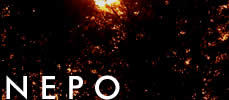

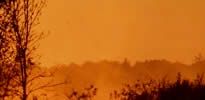



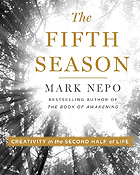
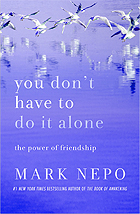
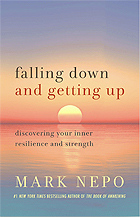
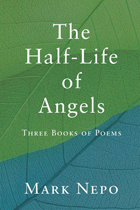
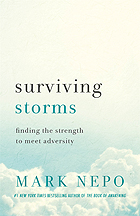
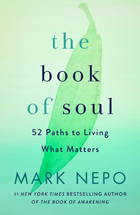
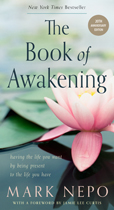

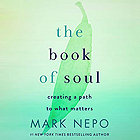
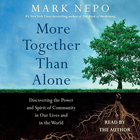
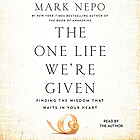

 There is an ongoing tension we each face between giving attention and getting attention. Giving attention steers us back to Center. It opens the vitality of the Universe and brings us back into the stream of Oneness. Giving attention is connective. On the other hand, getting attention is a form of drifting from Center. If attention comes your way, well enjoy, but cultivating it and seeking it is paddling away from Center. Getting attention is deceptively isolating. It ultimately leads to being seen but not held.
There is an ongoing tension we each face between giving attention and getting attention. Giving attention steers us back to Center. It opens the vitality of the Universe and brings us back into the stream of Oneness. Giving attention is connective. On the other hand, getting attention is a form of drifting from Center. If attention comes your way, well enjoy, but cultivating it and seeking it is paddling away from Center. Getting attention is deceptively isolating. It ultimately leads to being seen but not held.


